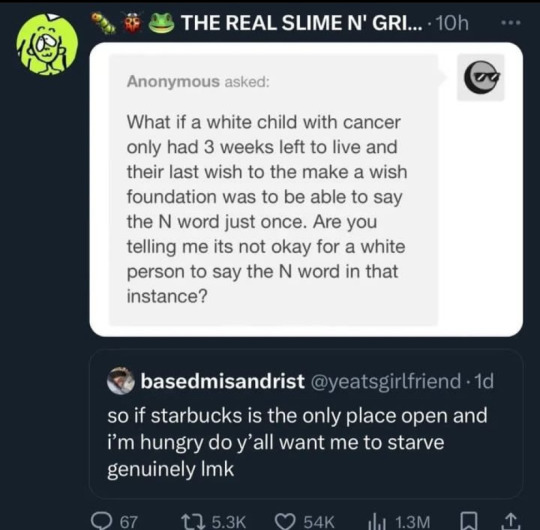Text

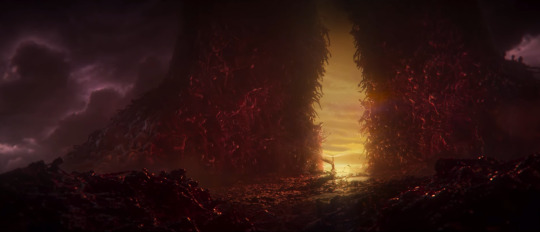
How do you spend 10 minutes of your video analysing the meaning of just these 2 shots and not once mention anything about pussy
#hard agree#personally I like vaati a lot#but the birthing symbolism and the whole pussy imagery is right there!!! this is where and how the golden order was born!!!#probably about monetization huh#elden ring#shadow of the erdtree#fromsoftware
5K notes
·
View notes
Text
Rereading Words of Radiance again and Eshonai and Venli are once again driving me insane. Like. What if we were both driven by knowledge and insatiable curiosity but you wanted freedom and I wanted power. What if you wanted to understand and I wanted to win. What if we were sisters. What if I lived my entire life in your shadow but now it is my chance to protect — what if I could make you stronger, faster, better. What if your trust in me was your un-doing. What if my trick could grant you power but you never wanted power in the first place. What if I gave you my heart’s desire but it was never yours. What if I found your body at the bottom of a chasm. What if I lived to become everything you could have been. What then
#words of radiance#stormlight archive#the stormlight archive#venli#eshonai#great post OP#'What if i lived to become everything you could have be' just broke my ribcage and tore my still beating heart out for study
507 notes
·
View notes
Text
Shallan Davar is a disaster and I love her (audio from Tom Cardy)
#this is so adorable!#also love me some Tom Cardy#the stormlight archive#cosmere#shallan davar#adolin kholin#kaladin stormblessed#brandon sanderson#*mild spoilers through Words of Radiance
2K notes
·
View notes
Text
"Ain't nobody what knows the cow better than the butcher" is such an inspired and underrated quote from Wayne Terrisborn, and it being preceded by "Your grasp of the language is startling, considering how you so frequently brutalize it" from Wax only makes it better in every way!
#cosmere#stormlight archive#brandon sanderson#mistborn era two#shadows of self#wax & wayne#waxillium ladrian#wayne terrisborn
586 notes
·
View notes
Text
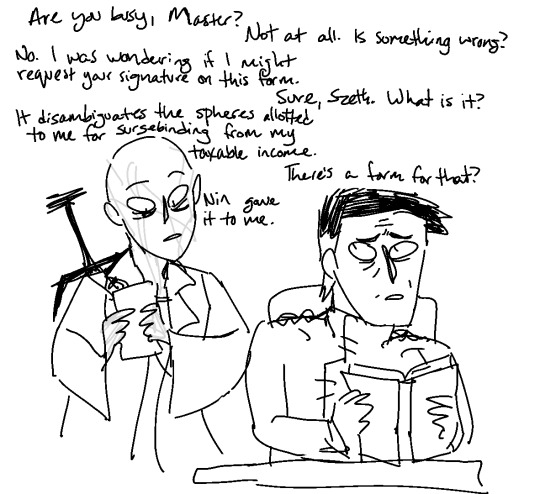
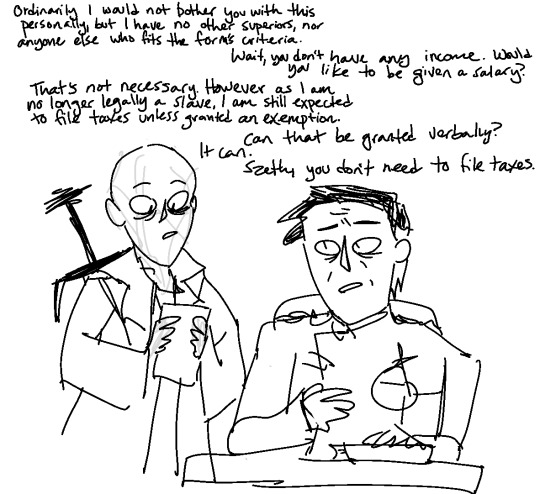
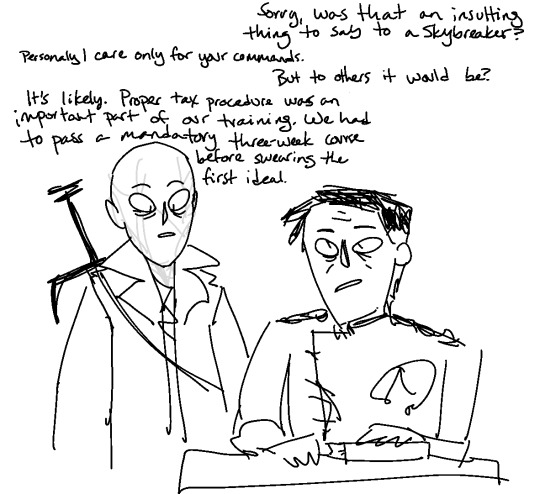
And before you ask, no, spren do not qualify as dependents.
141 notes
·
View notes
Text
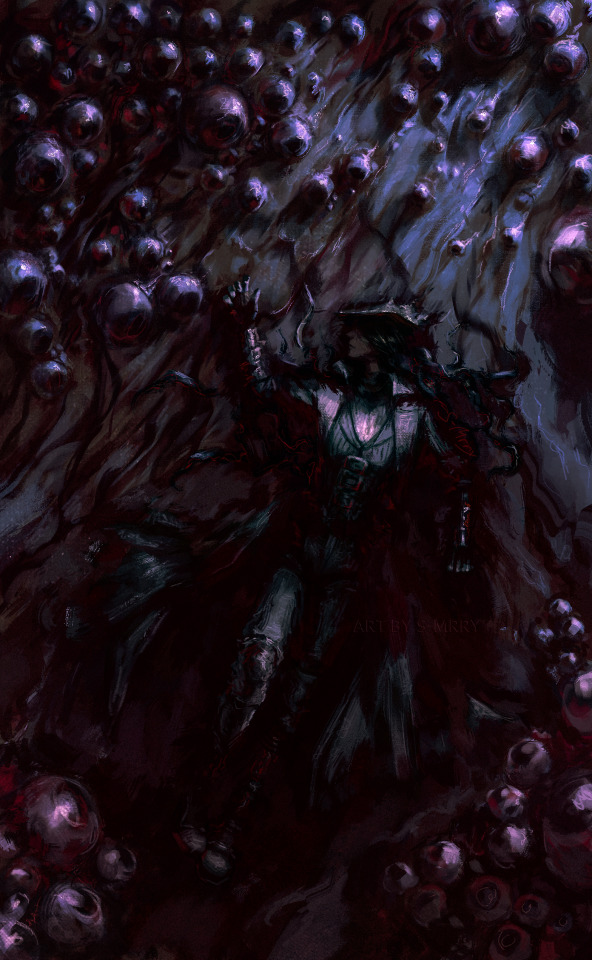
too much insight ig
#bloodborne#bloodborne fanart#soulsborne#true insight is gained from eyes on the inside#grant us eyes
2K notes
·
View notes
Text
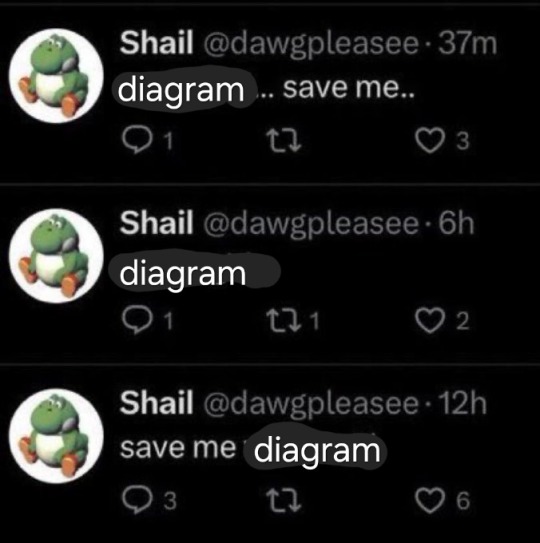
A ketek by Taravangian
423 notes
·
View notes
Text
Vivenna might be the Most 22 year old ever. Just an absolute mess. Failgirl in every way. Thinks she knows everything while knowing absolutely nothing. Arrogant as all hell right up until she gets the shit beaten out of her and then she immediately gives up on life. That's 22, baby!
#vivenna#warbreaker#cosmere#Love me some Vivenna posting!#love her arc in Warbreaker#and love the implied arc in regards to what comes after
354 notes
·
View notes
Text
Sanderson gave Kaladin Marsh's worldview with Kelsier’s charisma and then gave Moash Kelsier’s worldview with Marsh's charisma and I think that was very funny of him.
#honestly? S-tier take op#cosmere#stormlight archive#mistborn#moash#kaladin stormblessed#kelsier#marsh
188 notes
·
View notes
Text
Scadrian Youth Pastor voice: Yes! Slay queen! *Sits on a chair in the hip way (backwards)* but let me tell you about a Queen who literally slayed: Vin, the Ascendent Warrior...
825 notes
·
View notes
Text
Kaladin Didn’t Invent Therapy (And Why That’s Actually Great)
“...You need someone to talk to, Noril, when the darkness is strong. Someone to remind you the world hasn’t always been this way; that it won’t always be this way.”
“How do you … know this?” Noril asked.
“I’ve felt it,” Kaladin said. “Feel it most days.”
- Rhythm of War, Ch. 25 Devotary of Mercy
I’m writing as someone with a background in psychotherapy and peer support, and I'm bursting with excitement about one of my favourite topics. You can imagine why I love Kaladin’s arc in Rhythm of War so much! I actually yelled out loud when I read some of these parts the first time.
I’ve seen people online saying and making jokes that Kaladin invents therapy, and while that could eventually be true, what Kaladin actually invented in RoW is mental health peer support. Psychotherapy as most people would understand it simply doesn’t exist yet on Roshar. However, peer support is a legitimate modality for healing on its own merits. Even more importantly for the story, peer support is something Kaladin would personally really benefit from, and it fits his narrative arc way better than therapy would.
1. Therapy as we know it won’t exist for a while yet.
“We need to study their responses, use an empirical approach to treatment instead of just assuming someone who has suffered mental trauma is permanently broken.”
- Rhythm of War, Ch. 25 Devotary of Mercy
“Someone needs to talk to them, try different treatments, see what they think works. What actually helps.”
- Rhythm of War, Ch. 25 Devotary of Mercy
Obviously, Kaladin has not been educated in battle shock or melancholia or any other diagnosis. In Alethkar there's hardly any knowledge to be had on the subject. Even now in real life, research into effective interventions for various diagnoses is still ongoing, over 100 years after modern therapy was founded.
Building an empirical knowledge base* will take time, not to mention the years it will take to train new therapists across Roshar in how to provide interventions specific to various issues. Therapy as we know it today generally includes time in mentorship with another therapist, so in a way, the first therapist isn't a therapist. 😅 In the meantime, there are people who need help today, including Kaladin.
Peer support can fill that gap because its knowledge base is different. Peers bring their expertise, which is their years of trial and error, successes and failures - their lived experience. Peer facilitators need to know the basics of managing a group, and they have to be willing to share their own experiences and learn from the group. Thus, training peer leaders is relatively quick, and incredibly scalable and adaptable across cultures and many issues/diagnoses.
2. Peer Support is a distinct path to recovery that doesn’t require an expert in therapy.
Kaladin located six men in the sanitarium with similar symptoms. He released them and got them working to support each other. He developed a plan, and showed them how to share in ways that would help...Today they sat in seats on the balcony outside his clinic. Warmed by mugs of tea, they talked. About their lives. The people they’d lost. The darkness.
- Rhythm of War, Ch. 33 Understanding
“While you can’t force it, having someone to talk to usually helps. You should be letting him meet with others who feel like he does.”
- Rhythm of War, Ch. 25, Devotary of Mercy
Kaladin is already positioning himself to align with the values of peer support. Some of these values overlap with therapy, such as dignity, respect, inclusion, hope, and trust. What makes peer support different is a particular emphasis on equal relationships, self-determination, and personal growth (Peer Support Canada, 2022).
In peer support, the group facilitator is not considered an authority like a therapist would be. A peer leader may be further on the road to recovery, but they may not be. They are expected to listen and grow just like any other group member.
Because the leader of the group is also a learner, peer support groups tend to be more collaborative and open-ended. Everyone in the group has something they can take out of it and something to give. Everyone in the group is responsible for managing their own self care, and everyone in the group is responsible for the direction of their own growth. This is different from most therapy groups, which often have a specific focus or goal that the therapist is responsible for implementing. And speaking of responsibility...
3. Peer Support Fits Kaladin’s Narrative Arc Better than Therapy
At his father’s recommendation—then insistence—Kaladin took it slowly, confining his initial efforts to men who shared similar symptoms. Battle fatigue, nightmares, persistent melancholy, suicidal tendencies.
-Rhythm of War, Ch. 33 Understanding
…he’d learned—these last few months—that his battle shock could take many forms. He was getting to where he could confront it.
-Rhythm of War, Ch. 39 Invasion
I think everyone can agree that Kaladin needs to participate in therapy just as much as the other battle-shocked men he finds in the Devotary of Mercy.
However, in therapy, the focus is solely on the needs of the clients. A therapist should not be distracted by their own issues (when this happens, it’s called countertransference). Further, therapy is generally framed such that the therapist is the only expert in the room, which means therapists have a higher level of responsibility for how the clients are doing (which varies depending on the issue, the therapy modality, and the circumstances).
In his own recovery, Kaladin is working on trying to take less responsibility for others, so setting him up as a therapeutic authority could be harmful for him. In a position of authority, he might be tempted to replicate the hierarchical structure he was in before (which would impede his own growth), or try to save everyone (which could impede everyone's growth). He simply doesn’t have the mentorship or knowledge base he'd need to work through those issues before leading as an expert.
In contrast, the point of peer support is the mutual sharing of lived experience. The group facilitator is expected to share their own struggles (as a model of recovery), and allow others to support them. In the context of a more balanced power dynamic, Kaladin can give the other group members the space they need to grow, and he can pursue his own recovery without feeling like he’s letting others down. Also, he will be able to leave the group during KOWT without worrying that the group won't be able to run without him. Everyone in the group carries some responsibility for each other, so group members can come and go with less stress than a change in therapist would cause in group therapy.
This is the beauty of peer support. It can happen anywhere people with similar experiences get together. No formal education is required. What is required is a willingness to know yourself as well as you can; to share your experiences; to listen to others tell their stories; to question your own assumptions as you learn how others handle things differently; to look out for each other's safety; to care.
Peer support creates a place of belonging and a community repository of shared wisdom. Kaladin almost had it on Bridge Four, but his position of authority wouldn’t allow him to grow the way he needed. Peer support is what Kaladin needs - he needs a place where he can take off his armour among people who get it because they're struggling with similar issues, and without having a position of responsibility over them. When he (eventually**) attends the groups, they help him grow!
Anyway, that's why Kaladin didn’t invent therapy, and why I think that's great.
For the men chatting together softly, the change was in being shown sunlight again. In being reminded that the darkness did pass. But perhaps most important, the change was in not merely knowing that you weren’t alone—but in feeling it. Realizing that no matter how isolated you thought you were, no matter how often your brain told you terrible things, there were others who understood.
- Rhythm of War, Ch. 33 Understanding
---
*Funny enough, empirical research could lead Rosharan researchers right back to peer support. Empirical research on Earth has shown that modern therapy and peer support have similar levels of effectiveness (for example, for depression and PTSD).
**Look who’s resisting attending the groups he founded…KALADIN!! (shakes fist in the general direction of the sky) (This is the most relatable passage for me in this whole book, by the way, helper types unite lmao):
Kaladin looked down at the table. Had it? Had talking to Noril helped?
“He’s been avoiding joining in,” Teft said.
“I haven’t,” Kaladin snapped. “I’ve been busy.”
Teft gave him a flat stare. Storming sergeants. They always heard the things you weren’t saying.
- Rhythm of War, Ch. 38 Rhythm of the Terrors
Peer Support Canada. (2022). Peer Support Core Values. Accessed from https://peersupportcanada.ca/ Jun 27, 2022.
#i think this post is amazing#not only is it a post telling you about why Kaladin didn't invent psychotherapy#but it is also what I feel like is an incredible educational resource on the general area of psychotherapy#and what it means to be a therapist given different situations and relationships of power#give it a read! I promise it'll be worth your while#cosmere#stormlight archive#kaladin stormblessed
162 notes
·
View notes
Text
OK new game. Use this website to see how common your first name is, and then put that number in the tags.
#829183rd#126 people share mine first name#which makes us approximately a 1/55.5555 MILLIONTH of the worlds population!
137K notes
·
View notes
Text
Maturing is realizing all mistborn night Fanart are unrealistic since scadrial has no moon
68 notes
·
View notes
Text

wtf wtf
21 notes
·
View notes
Text
Wayne has been... interesting over the last few chapters and really this whole book.
Firstly I do think it's strong characterization for him to easily espouse and laud the greatness of Wax and Marasi while writing himself off. Proceeding to basically solve the entire apartment scene and downplay his accomplishments.
Wayne not only has a strong disdain for himself, but like many people in similar headspaces as him, he is not only unable to acknowledge his own positive attributes but is quick to actively downplay himself for the raising of others.
I doubt I am the first to see there's a strong connection between Wayne's power of bring sickly and unhealthy to then be the one taking punishment and intentionally being harmed to draw attention away from friends. It's like the allomantic equivalent of self-deprecating humor, which he is also consistently using, see again, the apartment scene.
Wayne is blinding rich, but lives a poor man's because he thinks he deserves it.
Wayne is constantly joking in his head about drinking because he's constantly thinking about drinking.
Wayne has the ability to slow down time, to create moments where there are none and yet he has defined the entirety of his life by a split second decision made by a parentless kid 25 years ago.
Wayne is so antagonistic towards Steris (she'll change Wax), so loathing of himself because not only can he not let go, he can't accept change in general.
If Wax is a positive side of Ruin, of change, it feels to me like can be Wayne is the toxicity of Preservation.
This is super rambly but I hadn't posted in a while and felt like these brainworms would be enjoyed.
#cosmere#mistborn#mistborn era two#steris harms#mistborn era 2 spoilers#waxillium ladrian#the lost metal#wax and wayne#wayne terrisborn
279 notes
·
View notes
Text
underrated friendship dynamic: adolin, skar and drehy
54 notes
·
View notes
